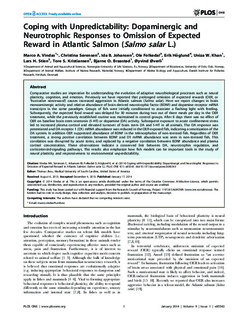| dc.contributor.author | Vindas, Marco A. | |
| dc.contributor.author | Sørensen, Christina | |
| dc.contributor.author | Johansen, Ida B. | |
| dc.contributor.author | Folkedal, Ole | |
| dc.contributor.author | Höglund, Erik | |
| dc.contributor.author | Khan, Uniza W. | |
| dc.contributor.author | Stien, Lars Helge | |
| dc.contributor.author | Kristiansen, Tore S. | |
| dc.contributor.author | Braastad, Bjarne O. | |
| dc.contributor.author | Øverli, Øyvind | |
| dc.date.accessioned | 2014-01-24T08:28:37Z | |
| dc.date.available | 2014-01-24T08:28:37Z | |
| dc.date.issued | 2014-01-17 | |
| dc.identifier.citation | Vindas MA, Sørensen C, Johansen IB, Folkedal O, Höglund E, et al. (2014) Coping with Unpredictability: Dopaminergic and Neurotrophic Responses to Omission of Expected Reward in Atlantic Salmon (Salmo salar L.). PLoS ONE 9(1): e85543. | no_NO |
| dc.identifier.issn | 1932-6203 | |
| dc.identifier.uri | http://hdl.handle.net/11250/109305 | |
| dc.description.abstract | Comparative studies are imperative for understanding the evolution of adaptive neurobiological processes such as neural plasticity, cognition, and emotion. Previously we have reported that prolonged omission of expected rewards (OER, or ‘frustrative nonreward’) causes increased aggression in Atlantic salmon (Salmo salar). Here we report changes in brain monoaminergic activity and relative abundance of brain derived neurotrophic factor (BDNF) and dopamine receptor mRNA transcripts in the same paradigm. Groups of fish were initially conditioned to associate a flashing light with feeding. Subsequently, the expected food reward was delayed for 30 minutes during two out of three meals per day in the OER treatment, while the previously established routine was maintained in control groups. After 8 days there was no effect of OER on baseline brain stem serotonin (5-HT) or dopamine (DA) activity. Subsequent exposure to acute confinement stress led to increased plasma cortisol and elevated turnover of brain stem DA and 5-HT in all animals. The DA response was potentiated and DA receptor 1 (D1) mRNA abundance was reduced in the OER-exposed fish, indicating a sensitization of the DA system. In addition OER suppressed abundance of BDNF in the telencephalon of non-stressed fish. Regardless of OER treatment, a strong positive correlation between BDNF and D1 mRNA abundance was seen in non-stressed fish. This correlation was disrupted by acute stress, and replaced by a negative correlation between BDNF abundance and plasma cortisol concentration. These observations indicate a conserved link between DA, neurotrophin regulation, and corticosteroid-signaling pathways. The results also emphasize how fish models can be important tools in the study of neural plasticity and responsiveness to environmental unpredictability. | no_NO |
| dc.language.iso | eng | no_NO |
| dc.publisher | Public Library of Science | no_NO |
| dc.title | Coping with Unpredictability: Dopaminergic and Neurotrophic Responses to Omission of Expected Reward in Atlantic Salmon (Salmo salar L.) | no_NO |
| dc.type | Journal article | no_NO |
| dc.type | Peer reviewed | no_NO |
| dc.subject.nsi | VDP::Agriculture and fishery disciplines: 900::Fisheries science: 920::Aquaculture: 922 | no_NO |
| dc.subject.nsi | VDP::Agriculture and fishery disciplines: 900::Fisheries science: 920::Fish health: 923 | no_NO |
| dc.source.pagenumber | 11 p. | no_NO |
| dc.source.volume | 9 | no_NO |
| dc.source.journal | PLoS ONE | no_NO |
| dc.source.issue | 1 | no_NO |
| dc.identifier.doi | 10.1371/journal.pone.0085543 | |
| dc.relation.project | Research Council of Norway, Project 119728 | no_NO |
